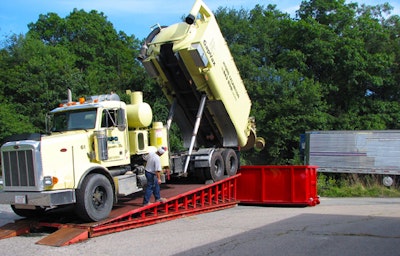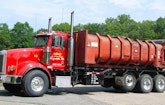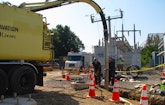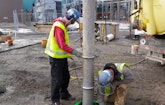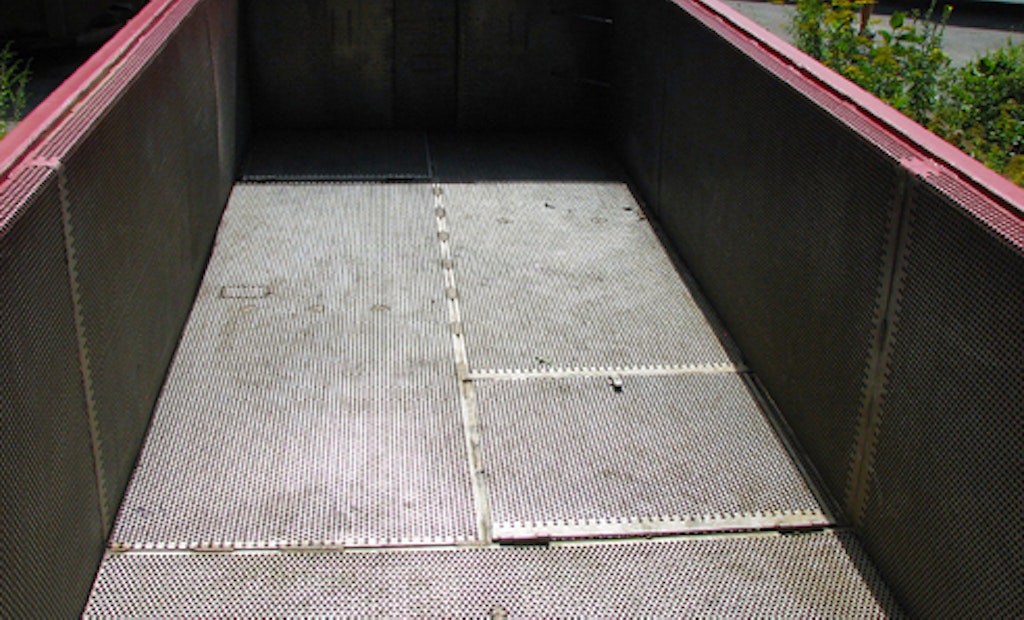
Interested in Trucks?
Get Trucks articles, news and videos right in your inbox! Sign up now.
Trucks + Get AlertsWe celebrate the continued dedication and hard work of drain cleaning contractors by revisiting companies profiled 10 years ago in Cleaner magazine. Check out the original story on the Advanced Pollution Control Corporation we featured in the July 2003 issue: “Safety Coach.”
When we first profiled Advanced Pollution Control Corporation of Bridgewater, Mass., 10 years ago, President Mike Flaherty ran a tight ship with an emphasis on safety and highly trained, well-equipped crews.
Now, with the company approaching its 40th anniversary, safety’s still the watchword on the job site. But the real strategic business emphasis is maintaining the flexibility needed to adapt to the evolving needs of the company’s service territory. In the last decade, that has expanded from primarily the New England states to encompass the whole Northeast, including the busy Pennsylvania, New York and New Jersey tri-state area.
Changing markets
APC’s specialties previously included servicing the infrastructure of New England’s coal-fired power plants: cleaning and maintaining boilers and silos, culverts and retention basins, pump stations, pipelines and manholes; and removing fly ash and other debris from surfaces. These services are still a regular part of the company’s revenue producers, but with the closure of numerous coal-fired plants in response to environmental concerns, the volume has decreased dramatically.
“Each plant had three or four individual boilers, so we did a lot of maintenance work in spring and fall,” explains Flaherty. But as the plant work has contracted, he’s cut his crews from 14 to eight full-time field technicians. Part-timers might work 50 hours a week, but it’s cyclical.
A decade ago, APC had just begun diversifying into daylighting buried utilities through hydroexcavation. This business segment has swelled significantly, as communities continue to grow and supporting infrastructure must expand, despite a relatively flat economy.
Fleet evolution
With this change in service emphasis, APC’s vehicle taskforce has also evolved. Flaherty now runs an all-GapVax fleet, noting that the original vacuum trucks needed an upgrade so the best option for APC was to replace them all.
In this daylighting work, APC crews try to perform mainly dry vacuum instead of hydroexcavation because it allows them to backfill with dry material. “The dry stuff is far easier to control,” Flaherty explains. “It’s neater to work with than mud slurry, and saves our customers money for fill material. We never bring waste from one job to another location due to environmental regulations, so if we can’t use what we excavate, the customer has to buy it.”
APC’s vehicle fleet currently includes 10 GapVax vacuum trucks, which Flaherty says are less expensive to maintain due to the thickness of their steel. “It takes a lot more punishment before it’ll deform or needs to be replaced. Also, because of their greater horsepower, the GapVax trucks can dig trenches in power plant yards, so we can do double duty with the same equipment. Their takeoffs also run compressors for jackhammers, and use a metal pipe to allow our crews to collect the material they dislodge.”
The rest of the fleet consists of two Galbreath roll-off trucks built-out by Beam Truck & Body Inc. For all these trucks, Flaherty first buys a Peterbilt chassis, and then the truck manufacturers do the build-out.
“Doing it this way adds $10,000-$12,000 to the final cost,” admits Flaherty, “but if you have a problem later, (with the Peterbilt chassis) you have a schematic to trace wiring back and solve issues. All their components are also more reliable.”
APC still runs wash trailers for some coal-burning plant cleanouts, though they’ve sold about half of what they had before. They now run three gooseneck trailers, which carry boxes containing small repair parts and other items they may need.
A fleet of 12 GMC Duramax crew cab diesel pickup trucks allow them to send large crews without having to charge customers for heavier trucks or an auxiliary van filled with parts and equipment, because it all fits onboard. These trucks also sport auxiliary diesel fuel tanks so they won’t run out during a job.
Two mobile hot-water pressure cleaners, 12 Galbreath 25-yard vacuum roll-off containers round out the fleet. A Galbreath Outside Rail Hoist is on hand for weekend calls when landfills aren’t open and APC needs to store evacuated material.
Customized equipment & safety
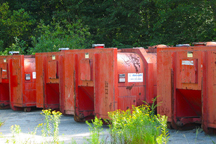
APC has its own welding shop, which they use to repair and maintain equipment and vehicles. They also use it to fabricate customer parts and accessories for purchased equipment that allows them to be more efficient and effective.
Some of the Galbreath dumpsters have been tailored into dewatering boxes in this shop.
“Sometimes we’re called in to vacuum out mussels and shells from intake pipes,” Flaherty says. “We scrape them out and vacuum them up. We fabricated two sets of ramps for getting vacuum trucks up on another truck bed to offload into these open-top dumpsters. We tripled the needed welding specs, so those ramps are strong and beefy enough to handle 50,000-pound trucks with 70,000-pound loads.
“We made an inside wall out of perforated stainless steel with dime-sized holes that fits inside these containers, separating the solids from the water. This allows us to bring solids to the landfill and pump the water back into the screening wells. This makes us legal by not transporting contaminated water.”
They also welded steel floors into Wells Cargo trailers to carry cascade breathing systems, which keeps technicians from having to strap 40-pound scuba apparatus on their backs.
Field technicians also have small five-minute escape bottles with their hoses, and still carry safety equipment go-bags. The crew cab pickups carry “yo-yos,” fall protection arresters that are run over a beam to support a person’s weight. These have been mandated in the past few years for spaces where workers might fall more than four feet, and APC started using them seven to eight years ago for the roughly 10 percent of jobs they perform in confined spaces.
Communications technology updated
Formerly, APC provided Nextel two-way radios and cellphones for field communications, but now they use smartphones. “We do a lot of texting between job sites and the shop,” Flaherty says. “There was too much interference with the shared antennas on the Nextels, so we got away from those about two years ago.”
The iPhones they use now are expensive, because even with provided extreme-duty Otterbox cases, the phones get damaged from dust and spray. Technicians must wear earplugs during waterblasting, so they don’t always get their messages instantly and have to check in several times a day with office manager Carleen Sullivan. Still, Flaherty believes the smartphones are more effective than their old communications system.
“I have my home phone number on my business card,” Flaherty says. “We’re our customer’s allies. When they call, they’re in trouble. When we come through in a pinch, that’s what they remember. When we get a call at 2 a.m. on a Sunday morning and have a crew on site at 6 a.m., they remember that. Our crew workers know they only get calls late at night when they’re really needed, so they don’t screen their calls. They pick up and know we’re sending them because it’s necessary.
“We post schedules 24 hours in advance on our shop’s backdoor bulletin board, in the locker room — where safety gear is stored — and they’re also in the pickup trucks.”
New customers, new work
APC found itself having to upgrade its technicians’ skill sets to be able to provide needed services for the utility companies who replaced the power plants as their largest customers.
National Grid and Spectra Energy are utility companies that supply electricity over a network of high-tension lines. For them, APC must access work sites through a land reserve known for rocky areas where poisonous snakes like to hide. Crews had to go to school to learn how to work safely in these areas, which is as much a psychological mindset as it is a set of physical do’s and don’ts.
Some of these utilities’ transformer yards are aging, and APC is performing engineering work to upgrade the 70-year-old networks. APC will go in and dig 80 to 90 holes, vacuum excavating 8-feet-deep by 5-feet-wide pits. Then they pour concrete footings for the steel transmission line towers, all before there’s any interruption of power, because the vacuum truck can use plastic hose to do its work.
Previously, they had to use backhoes, which resulted in highly disruptive power shutdowns or operators hitting live assets and dying from electrocution. Now, the only thing they must be concerned about is switching out a steel lance for a non-conductive fiberglass one that allows them to work while power remains flowing.
Happy customer strategies
Flaherty says that though markets and specific projects change, essential business practices remain most important in gaining and keeping good customers. “You’ve always got to prove your value,” he says. “Customers want to know what to expect for their bottom line. Reputation is everything, and actions speak louder than words in proving
efficiency, accuracy of work, cost-effectiveness and productivity. I think we’ve been late for a job maybe once in 40 years. Our crews are on site and productive at 7 a.m.”
He’s proud that APC maintains an “A” grade in ISNetworld, one of the largest compliance records management and reporting systems in America. Large corporations like Genzyme and National Grid us it to vet safety programs and OSHA records of potential vendors, reviewing hundreds of contractor performance categories, and issuing ratings.
Flaherty admits his biggest challenge today and into the future is finding quality employees. “The work ethic in this country has gone right down the chute,” he says. “We’ve tried to address it with lots of training for many different skills. When we’re on a job, our technicians have to be laborer, welder, problem-solver. This training is an investment in our company.
“I want to hire people who realize that our success on jobs is how they make their money, and that each one of them is part of that by bringing more value to the work site. If you can get a group of employees with a good work ethic and develop pride in the company, those two things will get you through many difficult situations.”
Flaherty says being a model of good work ethic as the head of the company is vital to its success. “Accept the 2 a.m. phone calls without complaint, and back it up with sincere actions, good equipment and well-trained employees,” he says. “Put forth an effort with individual and company pride. It’s a rare combination, but it works.”
